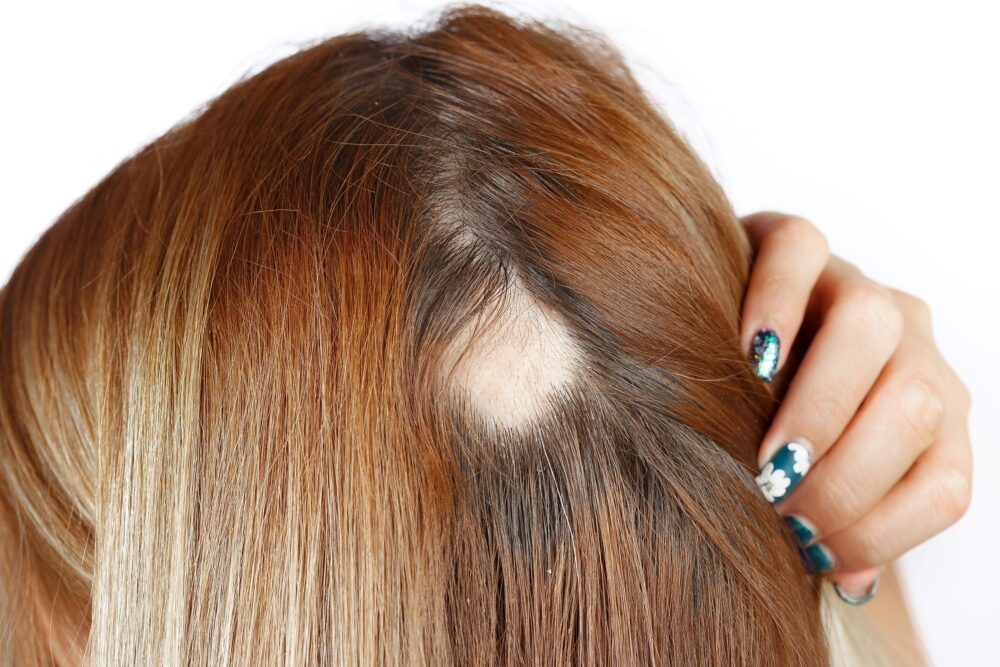Why Does My Hair Fall Out?
Learn why you are losing your hair and how you can minimize it.
You may have noticed that your brush and shower drain both seem to be clogged with hair lately. Perhaps your once voluminous locks have lost their volume. The thought of it is enough to drive anyone bonkers in the first place.
It is stressful to find out that you are experiencing thinning hair and hair loss, but you are not the only one.
Hair shedding is a daily event, clogging your drain is a sure thing, vacuuming regularly is part of the package, and yes, you have to clean your carpet to get rid of the hair. However, hair loss is a completely natural process.
Due to the fact that there are so many possible causes of hair loss, it can be tricky to determine what is causing it, and consequently, how to combat it.
Why do your tresses seem to be in such a state? Our experts helped you determine the root causes of hair loss and discovered the most effective prevention and treatment methods.
Why do I lose so many hairs?
It is completely normal to shed hair. A sudden increase in hair loss, known in medicine as telogen effluvium, may indicate some underlying issue.
Despite that, it takes time for a sign to show up. There are cycles to hair growth. After growing, the hair settles and sheds off. Every strand of hair is in a different phase of hair growth each moment.
It’s a long process. You might see quite a bit of hair fall now due to the events months ago.
Numerous factors can lead to excessive shedding. These are just a few.
You’re Stressed Out
Stress is known to cause changes in hormone levels that can lead to excessive hair shedding. For instance, the hormone cortisol is released during times of stress, and that causes the hair follicle to shrink. That’s why people who are under a lot of stress often notice hair loss on their heads.
If you notice this happening and aren’t sure why, talk with your doctor about whether anything else might be going on instead — such as a thyroid condition or medications that may be causing it.
Medications
Certain medications can also cause excessive shedding, including some cancer treatments and corticosteroids that are used to treat asthma, arthritis or other conditions.
And if you have an autoimmune disease such as lupus or rheumatoid arthritis, your immune system attacks your hair follicles, causing them to shed excessively. The immune system is attacking the follicle and destroying it.
In some cases — especially with autoimmune diseases — the drug may need to be stopped while you find a way to manage your symptoms without it. If you have another health condition that requires taking medication on a regular basis (like diabetes), talk with your doctor about what’s appropriate.
Pregnancy and breastfeeding
If you’re pregnant, breastfeeding or taking an estrogen-based birth control pill, it may cause excessive hair shedding. That’s because these medications can mess with the hormones your body uses to grow hair, so you may notice more hair falling out as a result. If this is the case for you, talk with your doctor about what other type of contraception you might be able to try.
Birth control
Birth control pills can cause temporary hair loss — specifically, the kind of hair loss that comes with telogen effluvium. That’s because the hormone progestin, which is a component of oral contraceptives and other hormonal medications, triggers your body to shed hair in order to let follicles rest and grow again.
If you’re taking birth control pills or another hormonal contraceptive and notice excessive shedding, talk with your doctor about switching to a different form of contraception or something else that might work better for you.
Excessive brushing
Brushing your hair can cause excessive hair shedding because it breaks the skin’s protective barrier.
When you make the skin barrier more permeable, it allows more things to get through. That includes the good and bad bacteria that need to be there to maintain a healthy scalp.
If you notice this happening after you start brushing your hair, talk with your doctor about whether it might be a sign of a medical condition — such as dandruff or psoriasis — instead of something else altogether.
Use of hair-dressing products
Hair-dressing products like mousse and gels can cause excessive hair shedding because they clog follicles, making them more susceptible to breakage from brushing or combing. If you’re using these types of products on a regular basis, talk with your doctor about switching to something gentler on your scalp, like natural oils and lotions instead.
Too much heat
Using a blow dryer on your hair will cause damage to it over time. Heat increases the rate at which water molecules travel through a substance (in this case, your strands). Heat also makes water molecules more energetic — that means they have more movement — which means they can move through your strands faster than before!
This increase in movement makes it easier for water molecules to break down the bonds between keratin proteins and these bonds are what hold the strands together. The more bonds that break down, the more your hair will feel like it’s falling out.
That’s why it’s so important to protect your hair from too much heat!
You don’t have enough iron in your diet
A lack of iron in your diet can cause excessive hair shedding, especially if you’re pregnant or breastfeeding. If you’re anaemic and notice your hair falling out more than usual, talk with your doctor about whether you need to supplement your diet with iron.
You’re going through a menstrual cycle
It’s more common for women to lose hair during their period than they would during a normal cycle. This is because of hormonal changes that happen during the menstrual cycle — such as the increase in hormones like estrogen, progesterone and testosterone — which can cause hair thinning or even balding on some women’s scalps.
The good news is that this type of sudden hair loss usually goes away once the menstrual cycle ends, but talk with your doctor if you notice excessive shedding still happening after a few months have passed since the end of your period.
Thyroid problems
Some thyroid problems may also cause excessive shedding — especially if your doctor has found an overactive thyroid gland ( hyperthyroidism ) or an underactive one (hypothyroidism).
That’s because both conditions can cause an overabundance of hair growth, which can lead to excessive shedding that’s difficult to stop. If you have an underactive thyroid, your doctor may recommend a treatment called levothyroxine to help the condition return to normal. In some cases, your doctor may also advise you to take a different type of thyroid medication or supplement (or even try a new treatment altogether) that does not cause excessive hair shedding.
Prolonged exposure to extreme temperatures or high altitude
Extreme heat and high altitudes can cause your body to lose a lot of its hair. The body is trying to protect itself by shedding its hair.
When the temperature rises, it just sheds more. It’s also possible that genetics or some other condition you have may cause excessive hair shedding — so if you’ve noticed a recurrence of it after living or vacationing in extreme conditions, talk with your doctor about what else might be causing the problem instead.
Hormonal imbalance
Some people have hair loss that is caused by hormonal imbalances and others have more severe cases of hair loss from genetics. It’s important to know if you have any signs of hormonal imbalance so that you can treat it appropriately.
If you’re concerned about hair loss, talk with your doctor about your options for treatment. You may want to consider supplements for healthy and balanced hormones. You may also want to see if there are any other medications that can help with your condition, such as testosterone replacement therapy or oral contraceptives (birth control pills).
When talking to a doctor, it’s best to be as honest as possible when they ask you questions about the factors that might be causing your symptoms and what treatments have worked for you in the past. If they see a pattern in your symptoms or think that you may be suffering from a genetic condition, then they will be able to recommend treatments accordingly.
A dramatic drop in weight
It’s common for people to lose a lot of weight after they have been diagnosed with cancer. It’s important to stay hydrated, eat a healthy diet, and get plenty of rest while you are recovering from treatment.
Hair loss can happen at any time during your recovery period. If you are losing hair because of the way you have been eating after treatment, then it is important to make sure that you get enough protein in your diet by eating more meat and fish as well as eggs, dairy products and beans.
Traction alopecia
A medical term for hair loss. It refers to the gradual shedding of hair from the scalp, a patchy hair loss. This occurs when the roots of your hair follicles become stretched out or stretched too much over time. In most cases, this happens gradually over time without any other symptoms or changes in your overall health — but sometimes this type of female pattern hair loss can be a sign of another underlying condition.
Traction alopecia isn’t a serious condition — in fact, most people who suffer from it don’t even realize it’s happening. But it can be frustrating and annoying when you notice your hair getting thinner and thinner until you finally decide to see a doctor about it.










